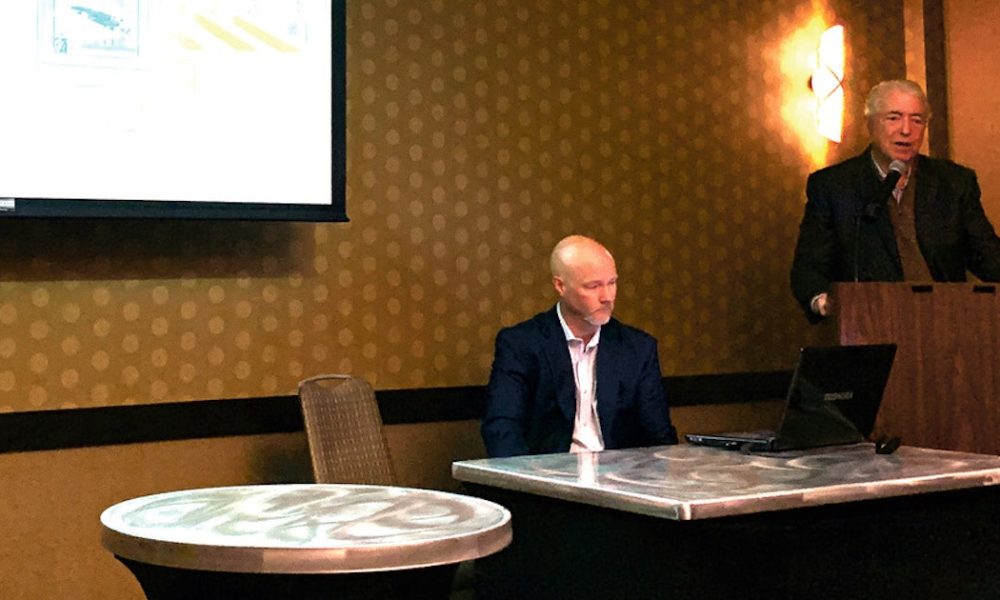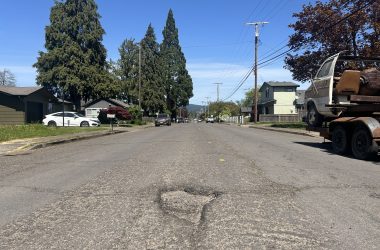 President of Murphy Plywood John Murphy and Murphy Plywood Chief Financial Officer Charlie Kimball present about challenges facing the timber industry during Springfield City Club’s meeting on Feb. 6. Aliya hall/The Chronicle
President of Murphy Plywood John Murphy and Murphy Plywood Chief Financial Officer Charlie Kimball present about challenges facing the timber industry during Springfield City Club’s meeting on Feb. 6. Aliya hall/The Chronicle
SPRINGFIELD – Leaders in the local timber community came together last week at the Springfield City Club meeting to discuss the importance of timber in Oregon and the challenges facing the industry today.
This presentation coincided with the Timber Unity rally in Salem that morning to protest Senate Bill 1530, the Cap and Trade tax plan. Increased regulation and taxation in Oregon is one of the major issues facing the industry, along with timber supply, subsidized Canadian Lumber and inferior Brazilian Plywood.
In recent years, regulation has been a continued issue, and the Cap and Trade tax law is one example of that, President of Murphy Plywood John Murphy and Steve Swanson, chief executive officer for Swanson Group Manufacturing, said.
The bill would put a 5.9% tax on every input, regardless of whether the company makes money or not.
Murphy said that the timber industry as a whole has experienced ”adversity and some heartbreak,” starting first with the Northern Spotted Owl in the late ’80s. Murphy said that originally he thought that would blow over, but practically overnight the industry had changed.
”We relied on the Siuslaw National Forest and it was gone within 18 months,” he said, adding that they lost 2/3 of their workforce. ”That’s the real impact that sticks with me today: the human impact. I will never forget the pain we went through with communities of shutting those mills down.”
Swanson said that timber supply is the ”single biggest issue.” He said that even though 63% of Oregon forests are federally owned, loggers can only have access to 8%, which means that the other 92% of their timber comes from private lands.
”No one is going to cut more than what the tree farm will grow,” he explained. ”If we managed lands appropriately we could see more jobs and we’d be thriving at a much better pace.”
Murphy added that it doesn’t help that every time they buy timber they are delayed by litigation from an environmental group. He said it’s become ”booked into the cost” and they are fighting three cases at the moment.
”Right now we have all these family-owned companies paying family wages and we have the hardest environmental rules on the planet,” Murphy said. ”We’re the best area for growing trees and we have an inadequate timber supply.”
Foreign competition is another issue Oregon’s timber industry is wrestling with. Subsidized Canadian lumber is selling a telephone-type log for $.50, which is far lower than what Oregon companies can sell logs for.
”It’s hard to survive in that business,” Swanson said, adding that he was part of the fight against subsidized lumber, which is now being re-negotiated.
The market also includes inferior Brazilian Plywood, which has been tested and has had a 100% failure rate. Swanson said he’s heard anecdotes from the Southern U.S. about construction workers having to dial their nail guns back because the wood is so weak.
Swanson and Murphy fielded questions from the audience, one of which asking what the timber industry would prefer to the Cap and Trade tax. Swanson said it was a complicated question, but global climate change can’t be solved solely in Oregon – but Oregon can stop the timber industry from surviving.
”I’m not a climate change scientist or a politician, but I know what will kill industry in Oregon,” he said. ”There has to be a better way to do it.”
Murphy said that the fear mongering in the timber wars needs to stop, because he wants timber to be part of the solution.
”I’m an environmentalist,” he said. ”It sounds cliche but my belief is we should always work to leave something better than we find it.”








